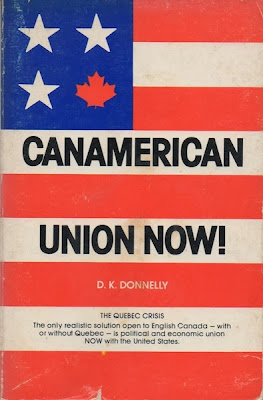National Post Editor-at-Large Diane Francis has been making the rounds flogging her latest. I've felt some sympathy. Her book,
Merger of the Century: Why Canada and America Should Become One Country, landed in the midst of the government shutdown in the republic to the south. Ever the capitalist, Ms Francis did her level best of capitalize on the sorry mess, beginning
her interview with Evan Solomon thusly:
If we were to merge, like quickly, like East and West Germany, we'd be 35 million Democrats and the Republicans wouldn't get anywhere in the House or in the White House. So there you go. There'd be no more logjams.
That Ms Francis, a born and bred Chicagoan, thinks Canadians would flock to the Democrats
en masse suggests that she has much to learn about her adopted country; that she believes Canadian children would be granted the right to vote suggests that she knows nothing at all about the Twenty-sixth Amendment to the Constitution of the United States.
Ms Francis began with the very same assertion when
speaking with Anna Maria Tremonti, which leads me to think that it also features in the book itself. I don't know for certain because I just can't be bothered to check it out of the library.
Hers is a tired, old idea (see: Smith, Goldwin), one that comes around every three or four decades. As with
Encke's Comet, no one much notices – but the few who do, like her publisher's jacket designer, find little in the way of inspiration.
Looking through my library I see that I've bought only one volume on the topic: Canamerican Union Now! Published in early 1978 by Griffin House, it's the lone book by D.K. Donnelly, a computer industry consultant from Toronto. Canamerican Union Now! was very much a knee-jerk response to the November 1976 election of the Parti Québécois. The author considered the months – months, I tell you – of handwringing that followed, before throwing up his own right and left in frustration.
Canamerican Union Now!
Diane Francis surrenders because, as she put it on Power & Politics, the Russians and Chinese are "wolves at our door." The author repeated the same words on The Current, in her National Post column, and in numerous – albeit identical – online posts.
Griffin House pitched its book as an open discussion, but it would seem that the computer industry consultant was talking only to himself. Though
Merger of the Century, a HarperCollins lead title, ranked 8,358 on Amazon.ca at the time of this writing, I believe Ms Francis has done a bit better.
Her newspaper's website has comments on the book from several dozen people, including the author herself. What's more, Amazon has three customer reviews! Someone calling himself "Interested American" informs: "the numbers and data (and new ideas) are presented here for us to take in, especially about the Arctic NW Territories [
sic] I had little awareness of, and consider in light of a changing world." Jared Nova chimes in with enthusiasm: "I'm an American who's always had a great interest in Canada. But this book helped me realize how much I didn't know."
The naysayer – tellingly, I think – is the sole Canadian, who observes that "the US nearly gutted itself financially and nearly took down the rest of the western economies", then dares add that "Canada's pragmatic mix of capitalism and socialism protected us from most of the blowback." He also notes that we don't kill each other nearly as much.
"The above critique is infused with anti-American bigotry", responds South Carolina's "C.I. Kendrick", who also believes Tim Burton's Charlie and the Chocolate Factory rates five stars. "A new Classic!"
I was greatly disappointed by Charlie and the Chocolate Factory myself... and, truth be told, I've never taken to the idea of a union between Canada and the United States. It's not that I don't love my American cousins, but that I see their country as being, well, foreign.
Those few campaigning for union, like self-described "Canadian-American" Diane Francis, may blame my father, whose record collection introduced me to the idea before I began elementary school. From
The Brothers-in-Law Strike Again! (Arc, 1966):
Oh, we share a common border with a country that you know,
Just take a look at your atlas, it's the one that's down below.
There's fifty states in the union and something should be done
To forget the War of 1812 and make it fifty-one.
Chorus:
There'll be color television,
Social security,
Racial segregation,
And the Birch Society.
You can cheer for Jimmy Hoffa,
You can join the Klan today.
You can even burn your draft card
When we're Canada, USA.
Everyone!
Now the ladies... 'cause with 35 million more Democrats an Equal Rights Amendment might finally get passed.
Note to American readers: Canada now has color television. We spell it "colour".
Trivia: The first Brothers-in-Law concert took place on 22 November 1963, the day the United States suffered its twenty-fifth political assassination.
There's a cultural difference for you.*
* "I have this great quote in the political chapter. Peter Drucker – who's the business guru of gurus, the late great Peter Drucker – and he said 'Culture eats strategy for breakfast.' So, I get it, but I'm a business person, I deal in facts and reality."

























